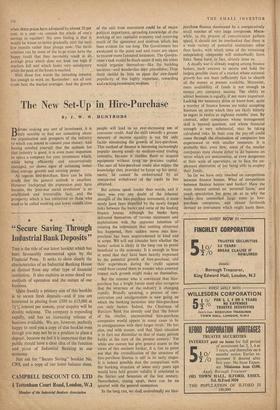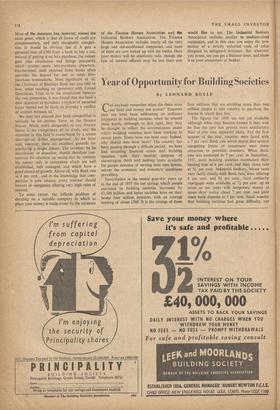The New Set-Up' in Wire-Purchase
By J. W. W.
HUNTRODS
BFORE making any sort of investment, it is only sensible to find out something about the organisation and prospects of the industry to which you intend to commit your money. And having satisfied yourself that the outlook for that industry is good, it is even more important to select a company for your investment which, while being efficiently and conservatively managed, yet shows signs of achieving better than, average growth and earning power.
As regards hire-purchase, there can be little doubt that the general outlook is excellent. However hackneyed the expression may have become, the 'post-war social revolution' is an established and irreversible fact; and the prosperity which it has conferred on those who used go be called working and lower middle class people will lead to an ever-increasing use of consumer credit. And the shift towards a greater measure of income equality is not the only factor stimulating the growth of hire-purchase. This method of finance is becoming increasingly popular among small- to medium-sized trading concerns, because it enables them 'to acquird equipment without tying 'up precious capital. The user of hire-purchase credit alstYenjoys the' knowledge that, provided he keeps up his instal- ments,' he cannot be embarrassed 'by an unexpected withdrawal of the credit he has obtained.
But actions speak louder than words, and if there., was ever any doubt of the inherent strength of the hire-purchase movement, it must surely have been dispelled by the newly forged links between the banks and some of the leading finance Jtouses. Although the banks have delivered themselves of various statements and explanations with the apparent intention 'of creating the impression that nothing abnormal has happened, ' their sudden move into hire- purchase has been unprecedented in kind and in scope. We will not consider here Whether the banks' action is likely in the long run to prove beneficial to the economy. It is enough to bear in mind that they have been heavily impressed by the potential growth of hire-purchase, and their experidnces during the credit squeeze could have caused.them to wonder what eventual impact such growth might make on themselves. , But the invester who is convinced that hire- . purchase has a bright future must also recognise that the structure of the industry .is changing rapidly. Broadly speaking, a process of con- centration and amalgamation is now going on which the banking incursion into hire-purchase can only hasten. Indeed, the Chairman of Barclays Bank has already said that 'the future of the smaller, uncommitted hire-purchase
• companies would appear in many cases to lie in amalgamation with their larger rivals.' He has also, and with reason, said that 'their situation is in fact not dissimilar to that of many private banks at the turn of the present century.' Yet while one cannot but give general assent to the views of this eminent banker, it is fair to point out that the crystallisation of the structure of hire-purchase finance is still in its early stages. It is indeed possible that the comparison with the banking structure of some sixty years ago would have held greater validity if antedated to the Sixties and Seventies of the last century. Nevertheless, timing apart, there can be no quarrel with the general contention.
In the long run, we shall undoubtedly see hire-
purchase finance dominated by a comparatively small number of very large companies. Mean- while, as the process of concentration gathers speed, it should not be overlooked that there is a wide variety of powerful institutions other than banks, with which some of the remaining independent companies will undoubtedly form links. Some have, in fact, already done so. A deadly war is already waging among finance houses, each anxious to secure and hold the largest possible share of a market whose national growth has not been sufficiently fast to absorb all the money at present available. Moreover, mere availability of funds is not enough to ensure any company success. The ability to attract business is equally, if not more important. Lacking the' necessary drive or know-how, quite a number of finance houses are today accepting business on terms which they are likely bitterly to regret in twelve or eighteen months' time. By contrast, other companies whose management skill is beyond question, and whose financial strength is very substantial, may be taking calculated risks. In their case the pay-olf could come through the elimination, of companies less experienced or with smaller resources. It is probable that, even now, some of the smaller companies must choose either' to do'business on terms which are uneconomic, or even dangerous at their scale of operations, or to face the un- pleasant alternative of riot being able to employ their funds..
So far we have only touched on competition between finance houses. What of competition between finance houses and banks? Here the main interest centres on 'personal 'loans,' and much speculation has gone on as to why the banks first committed large sums to hire- purchase companies, and almost forthwith devised an instrument which might harm them. Most of the comment has, however, missed the main point, which is that all forms of credit are complementary, and only marginally competi- tive. It should be obvious that if A gets a personal loan of £500 from a bank to buy a car, instead of getting it on hire-purchase, the money goes into circulation and brings prosperity which creates more hire-purchase elsewhere. Furthermore, cash' obtained from banks often provides the deposit' for one or more hire- purchase transactions. Most significant of all, the Chairman of Barclays Bank has also told us how, when reaching an agreement with United Dominions Trust as to the association between the two companies, it was found that the bank's then intention to introduce a system of personal loans 'would not be likely to provoke a conflict of interest between us.'
We may rest assured that bank competition is unlikely to do serious harm to the finance houses. Much more dangeroUs to any finance house is the competition of its rivals, and the situation in this field is exacerbated by a severe shortage of skilled management. As we have said, however, .there are excellent grounds for predicting a bright future. The investor, be he shareholder or depositor, should therefore con- centrate his attention on seeing that he commits his money only to companies which are well established, well managed, and which have a good record of growth. Above all, with Bank rate at 4 per cent., and in the knowledge that com- petition is now intense, every investor should beware of companies offering very high rates of interest.
To some extent, the difficult problem of deciding on a suitable company in which to place your money is made easier by the existence
of the Finance Houses Association and the Industrial Bankers Association. The Finance Houses Association includes nearly all the very large and old-established companies, and most of them are now linked up with the banks. Here your money will be absolutely safe, though the rate of interest offered may be less than you would like to see. The Industrial Bankers Association includes smaller to medium-sized companies, and in this case you enjoy the pro- tection of a strictly enforced code of rules designed to safeguard investors. But wherever you invest, see you get a balance sheet, and show it to your accountant or banker.











































 Previous page
Previous page